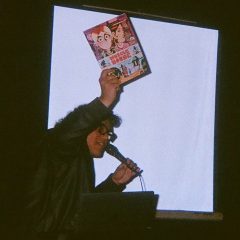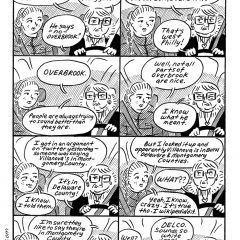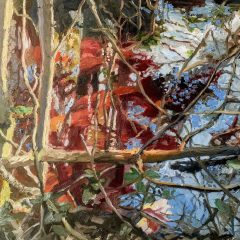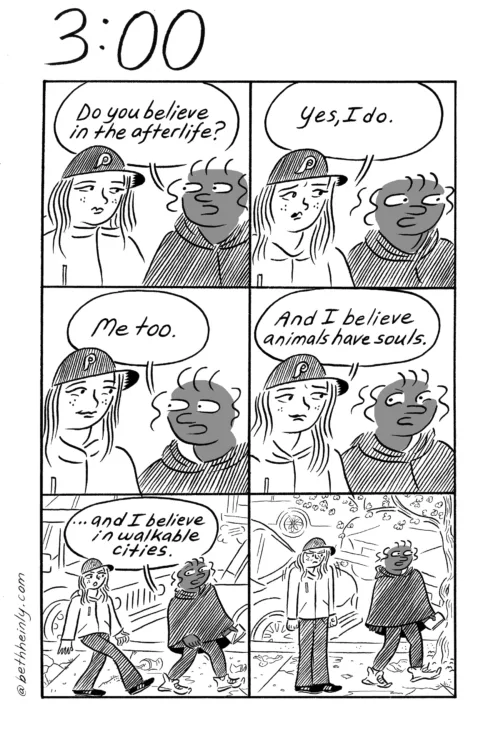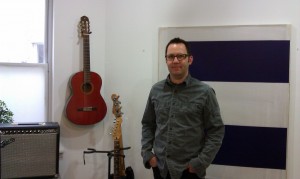
Artist Douglas Witmer thinks a lot about community and how he can create an ideal one around him–and beyond. You may know him as a co-owner, with his brother-in-law, of the Green Line Cafes, which I think of as the community hub of University City. Or maybe you know him as a musician, or by his art work. The thread that weaves through everything he does is that commitment to community, and how he’s just a part of a larger whole. The modesty carries over into his philosophy of art, including issues related to whether we should care if art works endure and whether giving significance to a single art work is a kind of hubris. Another thread that runs through Witmer’s thinking is how to integrate all his interests into all aspects of his life. So the cafes have become known for the art shows on the wall and the live music nights. Besides his family (like an old-fashioned shop-keeper, he lives right near the first Green Line cafe, which is right across from that Arcadia known as Clark Park), Douglas’ communities include the whole neighborhood–the University City Arts League gallery, the 40th Street Artists in Residence and the neighborhood at large. He’s also involved in the Museum of Art and Peace at his church in Germantown, the oldest Mennonite church in North America, where he shows art with themes of social justice and peace-making.
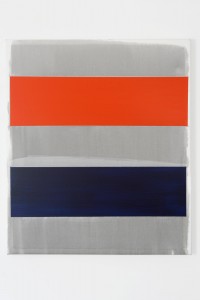
I wanted to know more about why Douglas, who hails from Lancaster farm land and lives a bustling life in the heart of the city, makes the sort of low-key work he makes, work that eschews imagery, rich surfaces, glorious colors, or even repetitive or hypnotic mark-making. So we sat and talked. Here’s how it went.
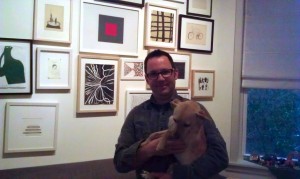
Libby: When you started the Green Line what did you picture?
Douglas: I don’t think any of us, Dan my business partner or me, had any idea of what it would be. We came at it because it was something we wanted in the neighborhood. We wanted to make a place where we would go. When this building (43rd and Baltimore, where we are sitting and talking) became available, that’s when we got serious.

What were you doing until then?
Dan was doing social science research and I was working at the Rosenbach. Both jobs were grant funded with end dates looming. That was almost 12 years ago. It’s a sweet moment in this neighborhood. In July I’ll have been here 17 years, almost 10 years with the cafe.
How did the art shows begin?
At the very beginning there were no art shows, partly because I didn’t want to say no to anybody. We held a poster contest. Anyone who asked, we gave them Bristol board. [They put the posters up in the cafe.]
People said, why aren’t you showing your own work? I was showing regularly and didn’t need a venue; I didn’t want to use it for me. The sheer foot traffic is quadruple what any gallery in Old City has. We give artists the exposure. I have an opportunity to help other artists. It became obvious we must!
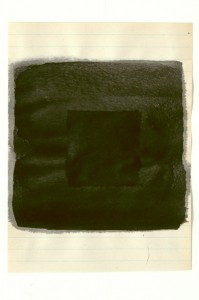
And how does the music work?
We use an outside promoter for the music.
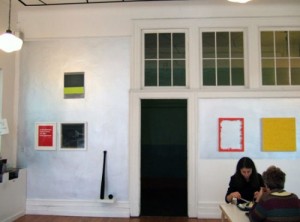
Are you a musician? Do you play in the cafe?
I’m just a serious hobbyist. My younger brother plays here, and he tours the world playing guitar or drums in the rock ‘n’ roll axis of evil. Before that [I] did the West Philly basement show circuit, leaky spaces with amps sparking.
Why are you so supportive of community?
The community I grew up in, you’re wired that way from your upbringing. I’m from a Mennonite background. People just naturally work together on things.
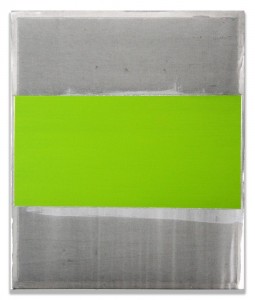
How does that religion express itself in your art work.
I’m a Mennonite in the way…it’s sort of like being a secular Jew. I’m a secular Mennonite. The idea of simplicity, the idea of humility, those are things I find meaningful, and I put them in my work. I’m not trying to say a specific thing. I’m setting up a visual situation that hopefully has a place for a person to engage with and have an art experience. I can set that in motion. If someone doesn’t have an art experience, it’s okay. It’s not for them.
You don’t expect a musician of one kind of music to engage with another kind, or for Tiger Woods to quarterback because he’s an athlete.
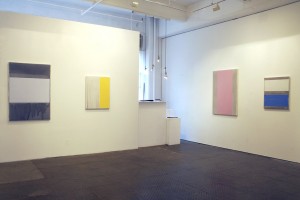
But because the work is so spare, don’t you think people find it forbidding and arcane? How do you reconcile that with simplicity and humility?
The art is a process I see as countering our culture’s fascination with speed, layering of information, and complexity, all of which tend to equal power or be associated with power. Getting things done faster, quicker, using a machine. You pick up a cell phone. Power is in the palm of your hand. [UPS] has a slogan–moving at the speed of business.
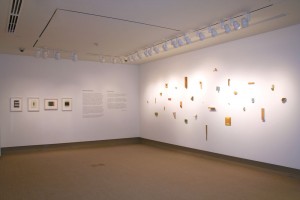
The Green Line does not move at the speed of business.
That’s a tendency in my art work, not a mission. My work is intuitive. But it does come from my background and those values.
Artists who come from a Mennonite background are conflicted. It’s a tradition that does not value visual arts. The culture is pragmatic. What does a painting do? They are things. This thing is nothing but wood, fabric stapled to it, and liquified plastic.
People oohing and aah-ing over your work–it’s a risk. That could make you proud of yourself.
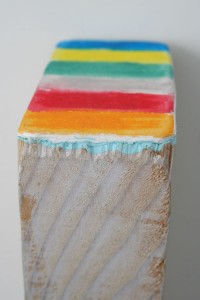
…My approach is completely additive. …I tried to find a way of painting where I couldn’t touch it–so I was dropping color with a turkey baster, kind of like color fields. …Could I just know what my choices are going to be? So I began to identify painting actions, to choose what I would do. If I insert myself too much, that does damage to the work. Along the way, at a certain point, I make decisions about a color. I’ll be thinking about a memory of a color, or I’ll choose a color. These are super-personal choices.
It’s for me and for others if they choose to receive it. I just live in hope that people take the moment to receive it.
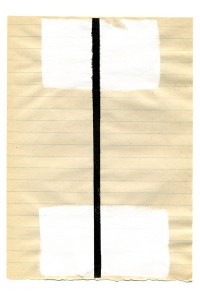
Can you tell me about your other art besides paintings on canvas?
I’ve been making works on paper [the School Papers series of paint applied to found school paper]. They’ve been getting more attention in the last year or two. I don’t have the same rule-based process-based approach. It’s way more open. People say there’s a play element. They are meditations, contemplation. I’m just sort of setting up a visual situation for people to enjoy. You don’t have to know anything,. You just have to look at it.
Just bring your curiosity and contemplation and receive a personal moment out of it.
People get it quicker with music–even though it’s more abstract and there for that moment only. Paintings have a life span. I have paintings that have changed. …I think we’re fetishistic about the archival nature of artwork. It’s okay for paintings to have a life span. …At the Rosenbach, I was cataloging scraps from Maurice Sendak. I don’t think he was thinking these would need to be archived.
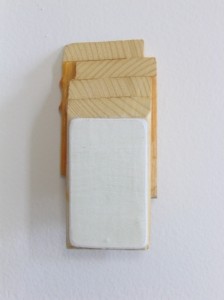
I admire your Fruitville series, which is on non-archival, found scraps of wood. I like the conversation in it about the passage of time and about play. I saw it a number of years ago and it has stuck with me.
It’s not about the individual pieces having meaning. I don’t think that way. This is an activity I’m doing . Fruitville is an example. It’s a body of work I have been working on for 12 to 15 years. The individual pieces are byproducts of a larger process.
I started thinking about canvases that way, and stopped dating them. I’m thinking about removing dates from older work. There’s no progression. When I realized that, it was freeing…
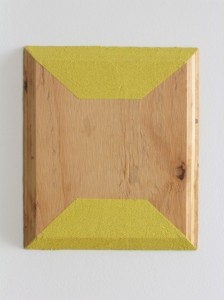
Fruitville, now it’s a mind set. In my studio I have a couple of mindsets in which I can work–I have three bodies of work. It’s like music. Today I’m going to play guitar, not drums. Am I going to make a piece with scrap wood? Is it going to look like a canvas?
Fruitville and School Papers, I didn’t let them out because I didn’t see how they relate to the paintings. Now I don’t worry about it. I’m doing something I wouldn’t have done before.
There’s people buying my work. Someone’s paying for this.They’re not just paying for the materials.
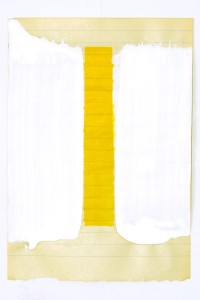
What’s next?
I’m not really sure where it’s going. What I would wish for, this is the irony of my life, speed, layering, complexity, that’s what I want in my life. I have an unbelievably leveraged life. My family, my art, the cafe. The Museum of Art and Peace. I would love to juggle less. I keep looking for what to phase out. But I just keep adding more and more. It’s probably less on the verge of collapse than I think it is.
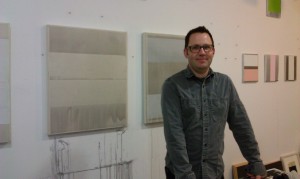
Would I like to have more collectors and spend more time in the studio? I’m a pretty social person. Facebook, it’s been incredible for artists. I found other painters doing this family of work. More than any other time, I feel I am making work that is interacting with others’, like musicians riffing. I am having conversations with people through the work.



